
Enter Text
The Drimmer Family of Drohobycz
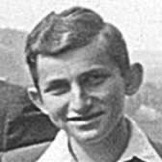
born in Drohobycz. A younger sister Irena (Mila) was born on 4 July, 1936. The Drimmer family was middle class; they lived in lived in relative comfort in the lumber factory on Truskawiecka Street, close to their extended family. Jakob Drimmer and his siblings grew up in a Yiddish-speaking home, but after his marriage, he and his wife spoke Polish in their household.
Isak Drimmer
in Austrian army uniform
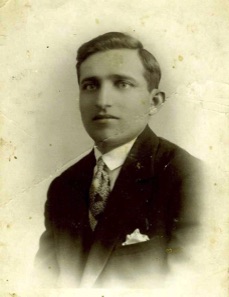
In the second half of the nineteenth century, Drohobycz's population expanded quickly. Many Jews came to the city from other parts of Galicia to find employment in the growing petroleum and wax industries. Izak Drimmer (b. 1878), who was a foreman in the Galicja oil refinery, came from the area south of Stanislawów. His father was Leibisch Rosler from Hawryłówka; his mother was Chana Drimmer. Isak married Elka Berger (b. 1878), daughter of Hersch Meilech Berger and Mirla Rosler, also from Hawryłówka. Isak and Elka had five children, born in Drohobycz: David Jakub (10 January 1904-1976), Chaje Ryfke, called Ryfcia, (1906), Syme (1907), Mirl, called Mirka (1913), and Abraham, called Bumek, (1916). Ryfcia was married and had two sons.
Jakub Drimmer
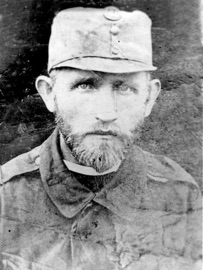
Isak's and Elke's eldest son Jakub worked as an accountant in a lumber factory in Drohobycz. He married Laura Gruber. Laura (b. 6 November 1904-1994) was the daughter of Osjasz Gruber (b.1888), a butcher in Mlynki Szkolnikowe near Drohobycz, and his wife Sara Berger. Laura had three siblings: Abraham, called Bumek, (1910), Ryfke (1912), and Jozef. Laura and Jakub married in 1933. On 1 May 1934, their son Marceli ( (now Marcel Drimer) was
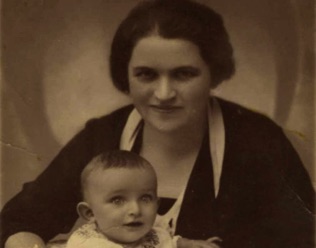
Marcel Drimmer and his mother Laura
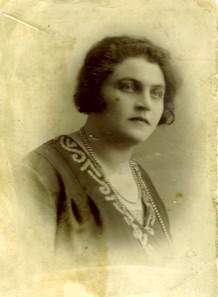
Laura Drimmer
Marcel Drimmer
Marcel and his sister Irene playing on the grounds where their father worked as an accountant
The Drimmer Family
The Soviet Occupation
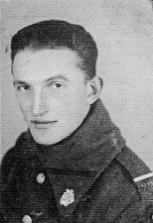
Abraham Gruber
After the Germans occupied Drohobycz, Jakub's brother-in-law, Abraham (Bumek) Gruber worked as a butcher at German Karpaten Öl forced labour camp. His wife Blima and daughter Libe lived with him. For a time, they were protected as the family of an“essential worker,” but in the fall of 1943, the Germans took the families of these protected workers to Bronica forest and executed them.
Bumek was despondent; he wanted to give himself up in the next aktion but after meeting Fela, a four-year-old Jewish girl, and her mother Tusia, a seamstress, their common misery united them. When Bumek received a tip about the next aktion, he decided to go back to his home town Mlynki Szkolnikowe. Like his sister and brother-in-law, Jakub
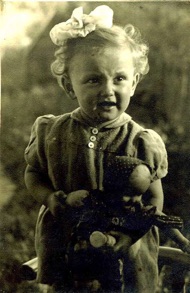
Liberation
The Soviet Red Army liberated the Drohobycz-Borysław area on 7 August 1944. In his reminiscences, Marcel Drimmer remembered that when the Russian were bombing the oil refineries, they were able to go outside without fear of being seen. Before this, it was too dangerous to leave their hiding place, but when all the other inhabitants of the area were hiding in fear of the bombs, they took the opportunity to go outside. At the liberation, Marcel, ten years old, was unable to walk on his own because his muscles had atrophied from sitting for so many months in their hiding place. It took him a long time to learn to walk again. Also, since it was necessary to whisper during their two years of hiding, he found it difficult to speak loudly after the liberation. Marcel's sister Irene was so ill in the harsh conditions in which they lived, that her family feared for her life.
Most of the Drimmer family photographs have been published with explanation on the website of the United States Holocaust memoiral Museum: https://collections.ushmm.org. An interview with Marcel Drimmer can be found at https://collections.ushmm.org
The material on this website has been generously donated by Marcel Drimer.
The Drimmer Family before the War
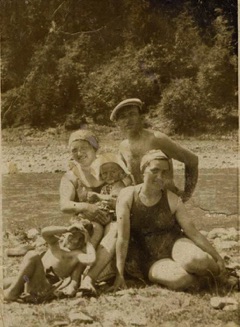
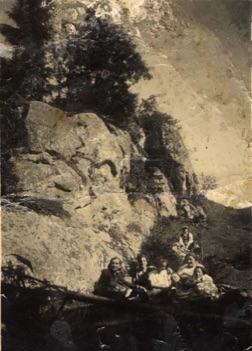
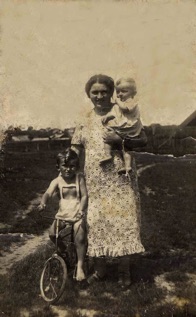

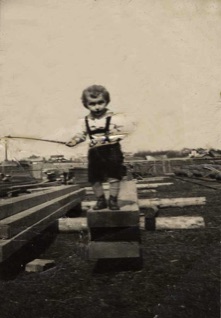
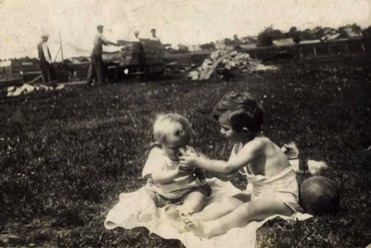

Ryfka Gruber holding her nephew Marcel beside the train tracks in the lumberyard
Marcel Drimmer playing in the lumberyard where his father worked
Laura Drimmer with Marcel
and Irene
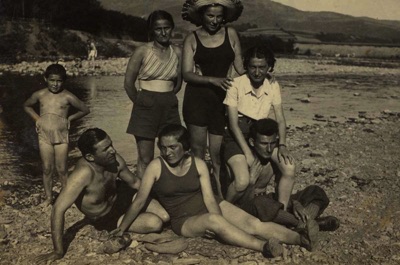
A group of friends swimming near a river
Laura Gruberand a friend in Austria
The Drimmer family on an excursion
by a river
A group of friends from Drohobycz hiking in the mountains in Urycz
Nazi Germany invaded Poland on 1 September, 1939. German forces entered Drohobycz but stayed only a short time because on 23 August 1939, Germany and the Soviet Union had signed a non-aggression pact. On 17 September, the Soviet forces invaded eastern Poland. Drohobycz then came under Soviet authority. In his interview with the United States Holocaust Memorial Museum, Marcel Drimmer recalled that his parents had been aware of and concerned about what was happening in the Third Reich. Therefore, when the Soviet tanks entered Drohobycz in 1941, the Jews of the town greeted them as liberators and threw flowers at the tanks. Marcel remembered life under the Soviets as uneventful. His father continued to work at his job.
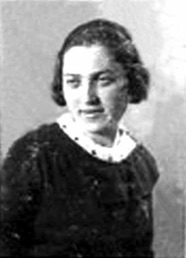
single young people were able to flee to the USSR. The husbands of his three sisters were taken into the Red Army. Two were killed fighting the Nazis
In August, 1942 the Drimmer apartment was very crowded with grandfather Izak, grandmother Sara, Jakub, his sister Ryfke and her two children. Jakub was the only provider. Food was rationed and only those who were working could obtain meagre rations. Jakub bartered for food with farmers, paying with whatever he could, such as a wedding ring.
Before the war Marcel had a nanny, Jancia. She now helped the family with food. She also played with him and when he contracted whooping cough, she offered to take him to her home for a few days. When Marcel's sister Irena begged their mother to bring him back home, Laura took off her armband with the Star of David and went to Jancia's home. As she entered the house, Jancia went into premature labour. Marcel was sitting in a corner crying. Laura helped as much as she could. In fact, she saved the young woman's life, but the baby was stillborn.
On the next morning, Jancia's husband returned from his night shift and informed the family about an aktion against the Jews that was taking place in Drohobycz. He said that if the Germans found Jews in his house everyone would be killed. He provided some bread for Laura but asked her to leave with Irena and Marcel. It was a cold, rainy day. Laura ran with her children to a wheat field nearby. Covered with their mother's raincoat, Marcel and his sister sat there, getting colder and colder. German soldiers and Ukrainian police entered the field and started to catch the Jews who were hiding. Irena and Marcel remember hearing screams, prayers, the Germans shouting, and dogs' barking. It went on for hours. They called it a "concert of death." As evening turned to night, Laura decided to return to Jancia's house. As they left the wheat field, they noticed a German soldier standing alone on the road with a dog. He saw Laura and her children, but turned around and let them go.
During the aktion, Jakub Drimmer was in the lumberyard where he worked and lived in a dormitory with other Jewish men. The next morning, he came to Jancia's house to take his wife and children back home. They found their home deserted. The grandparents, his sister Ryfke, and her children were gone. The house had been plundered by neighbors. Feathers had flown everywhere as they searched the pillows and quilts for valuables. The family had been deported, along with about 800 Jews to the death camp in Bełżec where they were murdered on arrival.
In October 1942, the Germans designated a few square blocks of Drohobycz as a ghetto and forced the Jewish population into it. It was guarded by Germans and Ukrainian police. Life there was very hard. Marcel's family had one room in an apartment of three or four rooms. Jakub Drimmer and other Jews who worked for the Germans were escorted by the police every day from the ghetto to their work camps in the morning and back in the evening. There were many aktions in the ghetto. After each, the Drimmer family found a new hiding place. After the Germans took the furniture, they slept on the floor. They also constructed a hiding place under the floor, hidden by a mattress. On one occasion, as Marcel Drimer remembered, two policeman came into the place where his uncle was had been hding under the mattress. One was a a German policeman, the other a Jewish policeman from the Judenrat, who had been a classmate of his uncle. When his uncle appealed for help, the Jewish policeman demanded money. He left when he received the bribe.
By 1943, Jakub was aware that the situation was becoming more dangerous and around September or October arranged for his family to escape from the Drohobycz ghetto. At first, he was able to smuggle them into the lumberyard; they hid in in a pile of drying lumber that Jakub had stacked in such a way that there was a hiding place for his family. Then for a few weeks, they hid in an attic over his office in the camp. Jakub brought food at night. A Polish woman working in the factory, who noticed this activity, planned to denounce him. She confided her plan to another woman, who told Jakub. Fortunately, before the woman could to execute her plan, Jakub asked a Jewish doctor working in the lumberyard clinic for help. He wrote an anonymous letter, supposedly from an SS officer, accusing the woman of spreading syphilis. She was apprehended by the SS and disappeared until after the war.
Jakub went to his wife's hometown Mlynki Szkolnikowe, where he made contact with their neighbours, the Sawinski family. This Polish-Ukrainian family agreed to take only Laura and Irena, but not Jakub and Marcel. Jewish men were circumcised; if they were discovered, they and the people who were hiding them would be killed. But in the last moment, Mrs Sawinski felt that she could not leave the small boy behind. They decided to hide all four members of the family.
In the beginning, the family stayed above the stable on the Sawinski's farm. Around the early fall of 1943, Laura Drimmer persauded the Sawinskis to hide Jakub. He had realized that the war was not going well for the Germans and that his position as a protected labourer was not secure. Soon after, other Jews whom the Sawinskis knew came to join them in hiding. There were thirteen in all. They were able to eat with the help of Bumek Gruber, who was still working as a butcher in the Karpaten Öl camp. He would send scraps from the workers tables with one of the Sawinski's sons. Once in a while he would send a piece of meat. But when Bumek with his new family came to hide at the Sawinski's farm, access to food was even more limted for both the hidden Jews and the Sawinski family.
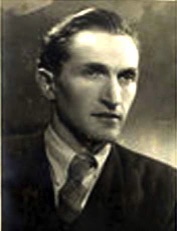
Ryfka Gruber
and Laura, he asked Jan and Zofia Sawinski if they would hide him and his new family. Bumek had made a false diamond ring using pieces of a chandelier. He offered it to the Sawinski family in exchange for their help. He never disclosed the fact that the diamond was an imitation but after the war, he paid for a new cow that the Sawinskis wanted to purchase. He asked them to give the ring back, pretending that it was a family heirloom.
The Drimmers, the Grubers, and other Jews, a total of thirteen, were hidden at first in the stable but later, throughout the winter of 1943-1944 when it was too cold to live in the stable, the Sawinskis created a hiding place in the attic and also dug a hole under the floor for about six peope. The thirteen Jews alternated in these hiding places.
Marcel Drimmer
Abraham Gruber before the war in Polish cavalry uniform
After liberation, only about 600 Jews were still alive hiding in the forests and other places
In the fall of 1945, Marcel Drimmer's family moved to Wałbrzych in western Poland, after eastern Poland, including Drohobycz, was annexed by the Soviet Union. With his sister Irena he graduated from high school in Wałbrzych. Both continued their education at the University of Wrocław and graduated with degrees in engineering: Irena in civil and Marcel in mechanical engineering.
Marcel Drimmer emigrated to the United States in 1961. His wife Ania came in 1963 and they married in December of that year. Ania completed her pharmaceutical studies in Washington DC. Her parents had been deported to Siberia in 1941 where she was born.
In 1963, Jakub, Laura, and their daughter Irena with her husband Manes Wysoki, who had survived the Holocaust in the Soviet Union, emigrated to Israel. Jakub Drimmer died in 1976; his wife Laura in 1994. Most of those in the Drimmer and Gruber families who went to the USSR in 1941 survived.
Jan and Zofia Sawinski and their four children were honored by Yad Vashem as Righteous among the Nations for saving the lives of thirteen Jews.
The German Occupation
Breaking the non-aggression pact with the Soviet Union, Germany invaded the Soviet Union In late June 1941. Its forces arrived in Drohobycz in early July. A bloody pogrom ensued in which more than 300 Jews were killed in the streets of town. Marcel's maternal grandfather Osjasz Gruber was killed by the Ukrainians in this pogrom.
In July 1941, Marcel's father Jakub was attending training courses in Lwów at the university. His twenty-five-year-old sister-in-law, Ryfke Gruber and other students were also with him . When an order was issued for Jews to report for forced labor, Ryfke insisted that Jakub should stay home because he had been in poor health. Ryfke reported to the German authorities; she never returned. She was killed in the Lwów pogrom along with many other Jews. Jakub returned to be with his family in Drohobycz. His sisters Syma, Mirka, and brother Bumek, along with many other .
© Valerie Schatzker 2016
This page is hosted at no cost to the public by JewishGen, Inc., a non-profit corporation. If you feel there is a benefit to you in accessing this site, your JewishGenerosity is appreciated. http://www.jewishgen.org/JewishGen-erosity.
Libe Gruber, murdered in Bronica Forest in 1943